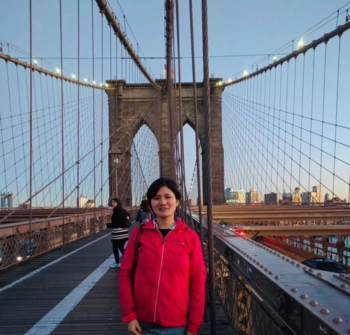Chengji (Sally) Xing

Fellow in the project "Conceptions of World Order and Their Social Carrier Groups" (May - October 2023)
Short Biography
Sally Chengji Xing (邢承吉) is a Richard Hofstadter Fellow and PhD candidate at Columbia University in the City of New York, interested in writing US history from transnational perspectives. Her dissertation, “Pacific Crossings”: The China Foundation and a Negotiated Translation of American Science to China, 1913-1949″, examines how American intellectuals in the first half of the twentieth century influenced the establishment of modern Chinese scientific education, and were in turn, influenced by their encounters with China.
Sally became interested in the Sino-American intellectual exchanges network in the China Foundation since she lived in Morningside Heights in 2016. Before joining the Columbia community in 2016, Sally studied at US history Tsinghua University (2008-2013), Peking University (2013-5), and was a residential fellow at Robert H. Smith International Center in Virginia (2017). She has taught US history as a graduate teaching fellow at Purdue University (2015-6), Columbia University (2017-2021), and served as an undergraduate advisor at the American Studies Center at Columbia University (2018-22).
Sally writes in both English and Chinese, and has published numerous academic reviews, journal articles and public history writings on topics of US history and transnational history. She also co-translated Akira Iriye’s Global and Transnational History into Chinese, and edited an interview with leading Americanists entitled History in Practice, a project twice won the History in Action Award of the Mellon Foundation. After Columbia, Sally plans to join the Faculty of History at Nankai University as an associate professor of US history, and an incoming fellow of Nankai’s “Hundred Young Academic Leaders Program”.
Project
Pacific Crossings: The China Foundation and a Negotiated Translation of American Science to China, 1913-1949China has become a major contributor to the world’s science today, with the largest number of qualified scientific publications in the world, a centralized government willing to sponsor the development of science, and world-class pioneering scientists in various disciplines. Where did this scientific power emerge from historically and how did this history connect with the rest of the world? My research project suggests that the Sino-American intellectual exchange network developed since the early twentieth century is the key to the scientific establishment in modern China. In the first half of the twentieth century, leading American intellectuals such as Teachers College’s educational scholar Paul Monroe and Columbia University’s prominent philosopher of pragmatism John Dewey frequently communicated with Chinese intellectuals, some of whom used to be their former students in the United States. Such exchanges of knowledge and ideas across the Pacific ultimately influenced Chinese choices in shaping modern scientific education and research, and the impact was generated primarily through the China Foundation (drawn from the second American remission of the Boxer Indemnity Funds) which later served as a sponsor of China’s development of science. Through the story of the China Foundation, I examine how the American intellectuals influenced the establishment of modern Chinese scientific education, and were in turn, influenced by their encounters with China. In telling the story of the China Foundation in the first half of the twentieth century, part of my intervention is to shift the predominant narrative of the progressive era US intellectual history from “Atlantic Crossings” to an equally dense and mutually constitutive set of exchanges of knowledge, ideas, and practices across the Pacific.
